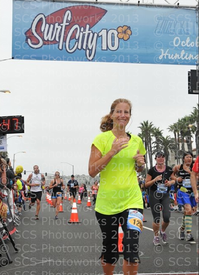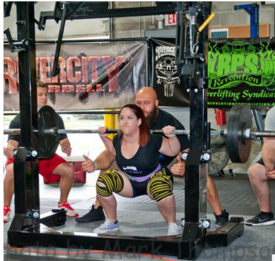Jeff Galloway or Hal Higdon

RunConquerCelebrate
Posts: 956 Member
For my last Half Marathon training I followed a Hal Higdon plan, but I have been seeing and reading a lot about Jeff Galloway. If you had to choose between the two who would it be and why?
0
Replies
-
How about a mix of the two? I tend to write my own plans after 2 years of training for halves. I steal what I like from about 3 different plans and then arrange them to fit my hectic life.3
-
I haven't tried Jeff Galloway, if only that I think his strategy (run/walk in various rations) is unappealing. Once I start running, I don't want to keep slowing down and restarting. It's jarring to me mentally and physically. However, there are tons of people that use this approach and love it.
Hal Higdon is great-- he has plans for just about every race length and ability. I am getting ready to start one of his Spring Training programs to lead into half training in the fall.
Basically, it's personal preference!1 -
How about a mix of the two? I tend to write my own plans after 2 years of training for halves. I steal what I like from about 3 different plans and then arrange them to fit my hectic life.
This sounds like a good idea, I have only ran one Half Marathon so not sure I should do this or wait until I run more but great tip0 -
I haven't tried Jeff Galloway, if only that I think his strategy (run/walk in various rations) is unappealing. Once I start running, I don't want to keep slowing down and restarting. It's jarring to me mentally and physically. However, there are tons of people that use this approach and love it.
Hal Higdon is great-- he has plans for just about every race length and ability. I am getting ready to start one of his Spring Training programs to lead into half training in the fall.
Basically, it's personal preference!
That is great information I really liked the Hal Higdon plan I never tried the Jeff Galloway plan0 -
I've used Galloway's to train for my first marathon and used it to get through the second. In neither was I running it to see how fast I could go. The course limit was 6 hours and I was basically trying to finish close to 5. Physically it felt like I was going at about 70-75% of capacity running 3 minutes and walking one.
I ran a half-marathon a few weeks ago (as part of my training for my next marathon) using Galloway's method. I went quite a bit faster (knowing that I didn't have to run that additional 13.1 miles)
I found that, although I was tired at the end of the marathon, I was able to participate as a member of the family rather than as a part of the furniture.
On shorter distances there is almost no difference in time/pace between running solidly and run/walking. If you run a 5K at your "flat out speed," it is the speed that has to carry you throughout the race and (hopefully) does not fall off. Or you can run/walk it with a bit more running intensity with a 30 second to 1-minute recovery fast pace walk and get to the end at the same timeand maybe (surprisingly) a little faster.
I ran a 10K course this past December where I ran the first 5k at the pace I could sustain for the entire distance and not have a huge fall off at the end. At the halfway point, I walked for 2-minutes to allow my heart rate to come down a bit and then ran 3 minutes and walked 1 minute all the way to the end.
Surprisingly, my second half time was faster than my first half (though it did not feel like it)
Over longer distances it makes a huge difference (at least to the people I know that have used both Higdon and Galloway). I ran a half-marathon using a 4-minute/1-minute run walk ratio without pushing too hard (the last 1.1 mile was a solid run and all those people we passed were hanging on for everything they were worth. We had plenty "left in the tank" as a few tried to fend off our charge down the last quarter mile). We didn't run anywhere near the pace we could have (when we were running) until the last 3 miles. We ran at a fairly comfortable pace for 4 minutes and then walked one. Our completion time was 2:13:47. Best of all we weren't dragging ourselves across the finish line.
Galloway uses the magic mile as the predictor and the way to set pace and ratio. The magic mile (for me) predicted just at 2:00:00 for the half-marathon I ran in three weeks ago. As I said, we weren't running anywhere near that pace AND it felt easy.
There are different subset programs for completing or running for time. All of them have you run at least the distance of the race (at least 13-miles for the half-marathon, 26 miles for the full). People running marathon distances who have experienced "the wall" that I know are now using his technique say "no more wall." His data suggests that using the "run all the way" technique that you are likely to experience the wall within plus or minus one mile of the longest run you did for preparation.
If you are running for time there are somewhat different running schedules and he takes you beyond the distance. But it is basically a 3-day per week running (run/walk) schedule.
He advocates long, slow runs for the endurance distance runs (at least 2-minutes per mile slower than what the table for your magic mile prediction tells you. In fact you can plug in the data on his website and it will give you the basic training pace and race pace. All you need to do is select the appropriate run/walk ratio. And the slower run/walk endurance runs allows you to recover more quickly.
It is easy to tell the ones using Galloway's method because you can hear their timers go off.
By the way, John "The Penguin" Bingham also advocates for a run walk technique.1 -
In for the responses. I do halfs regularly for fun right now and don't really train for them, but my son wants to run his first half in June and I told him I'd train with him. He's only 11 but can already do 10 miles so I'm not worried about whether or not he can do it. We start training next weekend and we've been having the Galloway/Higdon debate. I'd like to use Galloway with him because I think he will have more left in the tank at the end of the race, but he wants to try to run it all the way Higdon-style.
I did my first half and first (and only) full using Higdon and had no problem with it. However, something interesting happened this weekend. I was running a pretty hilly half and ended up having to walk a few times during the last three miles to let my heart rate come down. I was disappointed because I never need to walk and figured I'd blown my time goal, but I did feel stronger and faster after the walking. I actually finished with my fastest HM time of the six I've done in the last six months. I looked at my splits and those last three miles were the fastest as well. Oh... and like STrooper's experience - I didn't feel completely dead at the end.1 -
As a follow-up, here are the split paces as reported by my phone on my most recent half-marathon. There were two of us running together the entire way.
Mile 1: 9:45
Mile 2: 9:52
Mile 3: 9:31
Mile 4: 9:59
Mile 5: 10:10
Mile 6: 11:28
Mile 7: 9:28
Mile 8: 10:07
Mile 9: 10:06
Mile 10: 9:36
Mile 11: 9:33
Mile 12: 9:57
Mile13: 9:09
These are the splits with a 4-minute runtime and a 1-minute walk-time.
The drop-off at mile 6 is a "pit-stop" at the porta-potty. There was a bit of a hill at mile 5, miles 8 and 9 and we maintained constant effort rather than constant time on those. Mile 7 was a run down the dragstrip before turning around and running back the other direction towards the dragstrip starting area. But by mile 10 it was more about pace and there was a significant climb after 10 (in mile 11).
I don't know why mile 12 seems slow compared to Miles 10 and 11 because we were certainly moving forward at a pretty good clip. But there is a half-mile portion that is really slow (a water stop maybe?) before we got back on pace.
But the last 0.6 miles was run at less then 8:30/mile. Coming down the back straightaway and turns 3 and 4 of the Charlotte Motor Speedway and being able to flip from run/walk to a fast run was really great. In fact, my phone's GPS reported that the last 0.1 mile to the finish line was run at 8:10 mile.
The average pace for the 5K the night before was 8:12/mile for comparison purposes. So, I was able to run, at the end of the half-marathon, at the same pace that I was able to run a 5K run just the night before.
I attribute that to using the run/walk of Galloway's method and doing the associated training.1 -
I'm not even close to an experienced runner, but I used Galloway to run my first half, and will be using the same method for my next half. I have knee problems, and it's hard for me to even run an entire 5k, let alone anything longer. I've also just never desired to have to run an entire race. The run/walk really works for me...mentally I find it much easier to race 2 mins 30 seconds at a time instead of thinking I have to run the entire thing.
I did tweak the actual program though...Galloway told me my last long run should be 14 miles for my half. No way in heck! I backed it down to 11.5, and did just fine in my half.1
This discussion has been closed.




